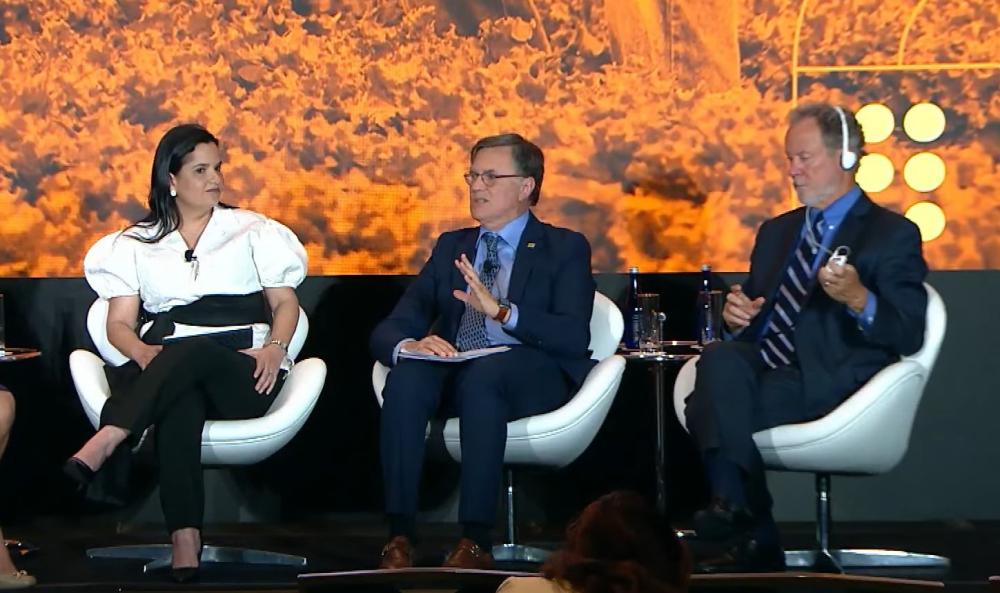Over the course of two sessions, during the most important multilateral forum in the world, special emphasis was placed on the need to strengthen the region’s role as a key player in discussions of the main global challenges and opportunities, with a view to meeting the 2030 Agenda for Sustainable Development.

San Jose, 22 September 2022 (IICA) – Global leaders, heads of state and high-level personalities agreed on the need to establish State policies and foster greater investment in science and technology applied to agriculture, in order to improve food security in Latin America and the Caribbean amid the current global crisis.
This consensus was reached during the high-level panel discussion “Food Security in Latin America and the Caribbean: Challenges, Strategies and Priority Actions”, organized by the Development Bank of Latin America (CAF), in which the Inter-American Institute for Cooperation on Agriculture (IICA) participated. The activity took place within the framework of the 77th Session of the United Nations General Assembly in New York.
Over the course of two sessions, during the most important multilateral forum in the world, special emphasis was placed on the need to strengthen the region’s role as a key player in discussions of the main global challenges and opportunities, with a view to meeting the 2030 Agenda for Sustainable Development.
Mohamed Irfaan Ali, President of the Cooperative Republic of Guyana, was one of the speakers at the meeting, which was attended by David Beasley, Executive Director of the World Food Programme; María Inés Castillo, Minister of Development and Inclusion of Panama; Qu Dongyu, Director General of FAO; and Manuel Otero, Director General of IICA.
Sergio Díaz-Granados, Executive President of CAF, and Christian Asinelli, Corporate Vice President of the multilateral agency, hosted the discussion.
“The food security situation in the region has deteriorated over the past five years. In Latin America and the Caribbean, 13 million more people, most of whom are women and children, suffer from malnutrition. This has a direct impact on educational outcomes”, warned Irfaan Ali.
The head of State considered that this issue is not given the priority it deserves on the public agenda: “Are we hiding this reality, or do we lack the political will to share this information with the population? If this trend continues, the region will be unable to meet goal 2 of the Sustainable Development Goals (SDGs), which is to eliminate hunger by 2030”.
Irfaan Ali also tied the increase in hunger and malnutrition to an upsurge in insecurity. “The population”, he said, “is becoming increasingly uneasy. Governments must take urgent action to protect the most vulnerable populations from food price hikes and to foster agricultural resilience”.
“Food insecurity is upon us. Failing to take action will spell disaster for us all”, he concluded.
The need for urgent action
Both Diaz-Granados and Beasley agreed with the Guyanese president that coordinated action is urgently needed to address the unique situation facing Latin America and the Caribbean, where the food crisis could become further aggravated by the fertilizer crisis triggered by the war in Eastern Europe. The region imports 85% of the fertilizers it uses in agricultural production.
“In addition to facing the effects of climate change, we are navigating a context of emergencies and conflicts, all of which has an impact on food production, supply chains and prices. This has direct repercussions on societies, widening the gaps. Urgent, joint work with our partners is required. We must work with the best to address this challenge”, said CAF’s Executive President.
Díaz-Granados noted that, in 2020, moderate or severe food insecurity affected almost 41% of the Latin American and Caribbean population—that is, almost 270 million people, which is well above the global average of 30.4%.
In turn, Beasley remarked that although the food crisis already existed before Russia’s invasion of Ukraine, supply chain disruptions triggered by the war and the worsening scenario helped to draw the world’s attention.
“The whole world is now watching the food insecurity crisis, which is serious in Latin America and the Caribbean. Many families are migrating from the most affected countries. Those migrating are people like you and me, who have lost all hope and would not leave if they had food. Food security will not solve all migration issues, but we must address it to bring back hope to people”, said Beasley.
Panama’s Minister of Development and Inclusion announced that her government is developing a strategy to fight against food insecurity, with a focus on territorial and community development.
“We are focusing on family farming. When we talk about those who suffer from hunger, we are talking about women, children and indigenous peoples”, said María Cristina Castillo, who added that, in her country, the percentage of people affected by hunger has decreased from 7% to 5%, currently affecting about 200,000 people.
Modernization through science and technology
Asinelli warned that food insecurity in Latin America and the Caribbean “has worsened and will continue to worsen if we fail to take immediate action”.

“The global context”, he added, “has affected production and supply chains. This provides multilateral development banks with a roadmap. Our countries cannot fight this on their own”.
The Director General of IICA noted that the global crisis places Latin America and the Caribbean before the eyes of the world.
“Our region is responsible for 13% of global food production and we are the world’s largest net food exporter, so we play a key role in food security”, he said.
Otero pointed out that, given these figures, it is unacceptable that 41% of the region’s population suffers from food insecurity.
“We are doing something wrong. If we have food surpluses, why are we facing food insecurity? Agriculture must produce, but it must do so within a framework of macroeconomic stability and accessible food for everyone”, he said.
In this regard, he highlighted the need to increase intra-regional trade and to foster State policies that would allow for guaranteeing the viability of family farmers, who provide food for domestic consumption in the countries.
Otero added that it is imperative to build a new, more knowledge-intensive agriculture sector, while prioritizing science and innovation.
“The difference in production between the most advanced farmers and those lagging behind is 10 to 1. We must undertake modernization efforts in agriculture”.
More information:
Institutional Communication Division
comunicacion.institucional@iica.int











